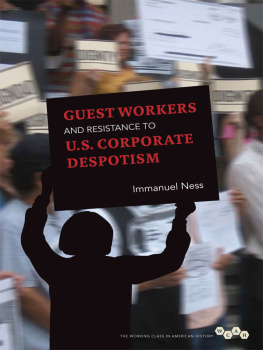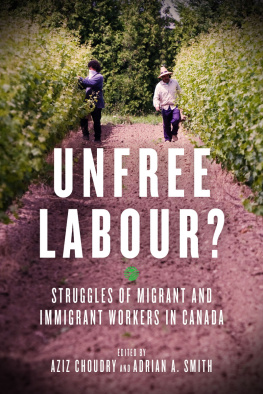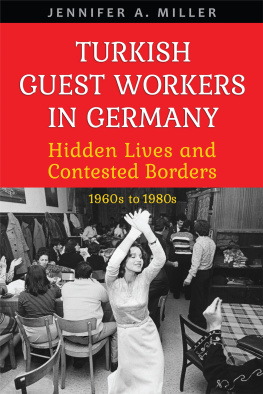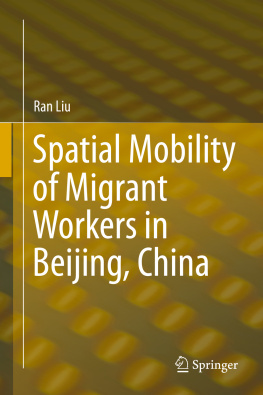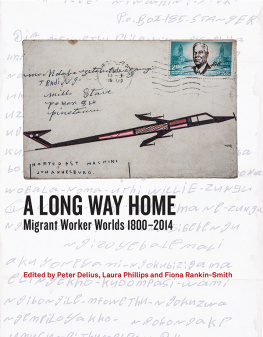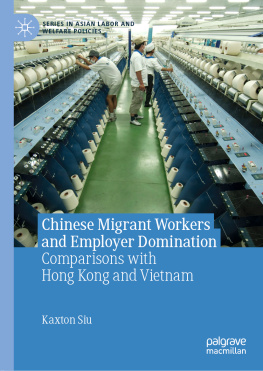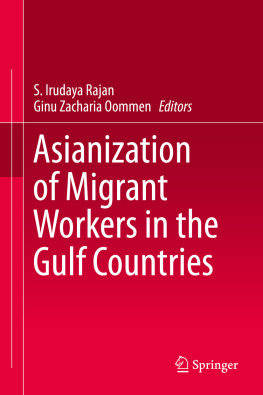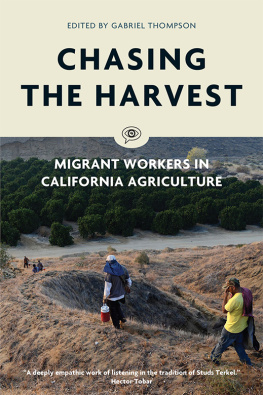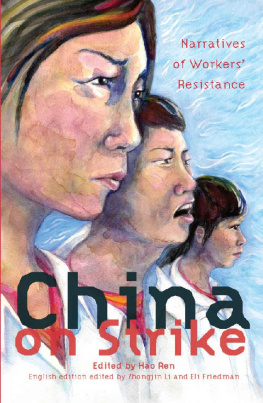Ness - Guest Workers and Resistance to U.S. Corporate Despotism
Here you can read online Ness - Guest Workers and Resistance to U.S. Corporate Despotism full text of the book (entire story) in english for free. Download pdf and epub, get meaning, cover and reviews about this ebook. City: United States, year: 2017;2012, publisher: University of Illinois Press, genre: Politics. Description of the work, (preface) as well as reviews are available. Best literature library LitArk.com created for fans of good reading and offers a wide selection of genres:
Romance novel
Science fiction
Adventure
Detective
Science
History
Home and family
Prose
Art
Politics
Computer
Non-fiction
Religion
Business
Children
Humor
Choose a favorite category and find really read worthwhile books. Enjoy immersion in the world of imagination, feel the emotions of the characters or learn something new for yourself, make an fascinating discovery.
Guest Workers and Resistance to U.S. Corporate Despotism: summary, description and annotation
We offer to read an annotation, description, summary or preface (depends on what the author of the book "Guest Workers and Resistance to U.S. Corporate Despotism" wrote himself). If you haven't found the necessary information about the book — write in the comments, we will try to find it.
Ness: author's other books
Who wrote Guest Workers and Resistance to U.S. Corporate Despotism? Find out the surname, the name of the author of the book and a list of all author's works by series.
Guest Workers and Resistance to U.S. Corporate Despotism — read online for free the complete book (whole text) full work
Below is the text of the book, divided by pages. System saving the place of the last page read, allows you to conveniently read the book "Guest Workers and Resistance to U.S. Corporate Despotism" online for free, without having to search again every time where you left off. Put a bookmark, and you can go to the page where you finished reading at any time.
Font size:
Interval:
Bookmark:

to U.S. Corporate Despotism
THE WORKING CLASS
IN AMERICAN HISTORY
Editorial Advisors
James R. Barrett
Alice Kessler-Harris
Nelson Lichtenstein
David Montgomery
A list of books in the series
appears at the end of this book.
Resistance to U.S.
Corporate Despotism
IMMANUEL NESS
UNIVERSITY OF ILLINOIS PRESS
Urbana, Chicago, and Springfield
2011 by the Board of Trustees
of the University of Illinois
All rights reserved
Manufactured in the United States of America
1 2 3 4 5 C P 5 4 3 2 1 This book is printed on acid-free paper.
This book is printed on acid-free paper.
Library of Congress Cataloging-in-Publication Data
Ness, Immanuel.
Guest workers and resistance to U.S. corporate despotism /
Immanuel Ness.
p. cm. (The working class in American history)
Includes bibliographical references and index.
ISBN 978-0-252-03627-9 (cloth) ISBN 978-0-25207817-0 (pbk.)
1. Foreign workersUnited States. 2. Labor marketUnited
States. 3. United StatesEmigration and immigration
Economic aspects. 4. United StatesEmigration and
immigrationGovernment policy. I. Title.
HD 8081. A 5 N 47 2011
331.6'20973dc22 2011004563
This book is the end result of five years of research on guest workers and transnational labor rooted fundamentally in my endeavor to understand the transformation of labor markets and worker representation from 2005 to 2010. In this historical era of neoliberal capitalism, individualism, and egoism, I was the beneficiary of the time and energy of so many people on four continents who always reserved precious time to guide my research in the field and writing and synthesizing the work. The assistance and advice renewed my awareness that this book is an endeavor that originates in people sharing narratives and knowledge.
The focus of this research has been to advance understanding the centrality of migrant labor in comprehending the nature and scope of the working-class transformation in the early twenty-first century. My strong interest to explore guest work and the restructuring of the U.S. labor market has inexorably directed my research, through which I came to recognize the inherent influence of the political economy of labor markets in countries of the Global South that are sources of temporary labor. Thus, this book examines how contemporary neoliberalism and guest worker policies reshape labor markets in two sending countriesIndia and Jamaicaand the United States, the dominant receiving country in the world for migrant labor. This research could not have been achieved without the support of workers, labor organizations, and academic institutions.
I was fortunate to have access to important archival documents, and learned a great deal from research conducted at the International Institute for Social History (IISG) in Amsterdam. Marcel van der Linden, research director of the IISG, provided critical historical direction and guidance through explaining intricate history of U.S. and European trade unions and labor migration in the last two centuries. In New York, I also benefited from the use of the labor archives at the Tamiment Library and Robert F. Wagner Archives, headed by Michael Nash. I also am thankful for the use of research and archival materials at the University of the West Indies, in Mona, Jamaica; research at the Centre for Economic and Social Studies in Hyderabad, India; and the Institute for Social Development, Kolkata, at the University of Calcutta.
This book benefited immensely from the advice and critical comments of authorities on labor migration throughout the world. Numerous specialists have shared their time to explain the intricacies and trajectories of local, transnational, and global labor migration. I am most grateful to workers in India, Jamaica, and the United States who spoke with me and allowed me to write down their experiences. I would like to thank each worker individually for their time, but most have asked that I keep their names anonymous to protect their identities to ensure they are not discriminated against by government migration agencies and labor contractors. In addition, I would like to thank workers in the United States of all nationalities who also shared their experiences, from displaced employees to guest workers themselves. Thus, to ensure migrant guest workers identities remain confidential, I have used pseudonyms to identify all the guest workers interviewed.
In India, I would like to especially thank Dr. Arun Kumar of the Centre for Economic and Social Studies in Hyderabad, who spent days interviewing low-wage workers in Telugu and translating the narratives into English. I also thank Kunal Chattopadhyay, professor of history at Jadavpur University in Kolkata, who carefully read and commented on the manuscript. I also thank Debdas Banerjee and Amiya Kumar Bagchi of the Institute for Social Development in Kolkata for sharing their exhaustive and detailed knowledge of labor and the Indian political economy.
My research on Jamaica notably was advanced by my conversations with Obika Gray of the University of Wisconsin, Eau Claire. In Kingston and New York City, I thank Kevin Gusscott for arranging incisive interviews with workers and students who traveled and were planning to embark on their journey in the United States. I particularly express gratitude to Olivia McDermott and Wynsome Eminike, present and past graduate students at City University of New York, who imparted indispensable knowledge of Jamaicas contemporary abusive system of labor recruitment and contracting for hospitality workers. Maderie Pam Miller, an astute observer of the Jamaican political economy, labor market, and popular culture provided perceptive advice that advanced this project from beginning to end.
In other regions, I am grateful to Edson Urano of the University of Tsukuba, Japan, and Hirohiko Takasu, project director of the Research and Education Center for Fair Labor at Hitotsubashi University in Tokyo, who provided important comments on my research, advice, and guidance on labor migration policies in Japan and throughout the world.
I received important institutional support to conduct research from Brooklyn College and the City University of New York. A Tow Faculty Travel Grant that I received covered my travel expenses in India. In addition, I am grateful for travel funding from the PSC-CUNY Research Foundation for my research trips to Jamaica. I thank the University of Massachusetts Labor Center for a grant to commission my research among guest workers in the Cape Cod region, a major destination for guest workers from Jamaica, who are vital to servicing the regions tourist economy.
I especially thank Beverly Tomek, a historian of nineteenth-century U.S. migration, for relentlessly encouraging me to finish this manuscript, taking the time to read and have a second look at this book, and urging me to finish this work. I thank all others who have advised me on this project, especially Steve Bronner, Michael Goldfield, and Joseph Ness.
I am indebted to the two reviewers for the University of Illinois Press who helped focus this research and provided sage advice on my assessment of labor migration, which was indispensable in helping to transform the manuscript into a book. Also at the University of Illinois Press, I thank Laurie Matheson for her interest in this work and her dedication in shepherding this manuscript to publication, and I appreciate the guidance of senior editor Tad Ringo. Additionally, I would like to thank the copyeditor, Walt Evans. Last, I am most thankful to my family and friends, who tolerate frequent absences and detachment from customary activities of life to devote my attention on research and writing.
Next pageFont size:
Interval:
Bookmark:
Similar books «Guest Workers and Resistance to U.S. Corporate Despotism»
Look at similar books to Guest Workers and Resistance to U.S. Corporate Despotism. We have selected literature similar in name and meaning in the hope of providing readers with more options to find new, interesting, not yet read works.
Discussion, reviews of the book Guest Workers and Resistance to U.S. Corporate Despotism and just readers' own opinions. Leave your comments, write what you think about the work, its meaning or the main characters. Specify what exactly you liked and what you didn't like, and why you think so.

